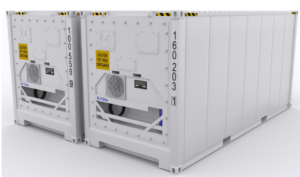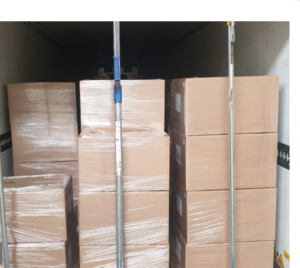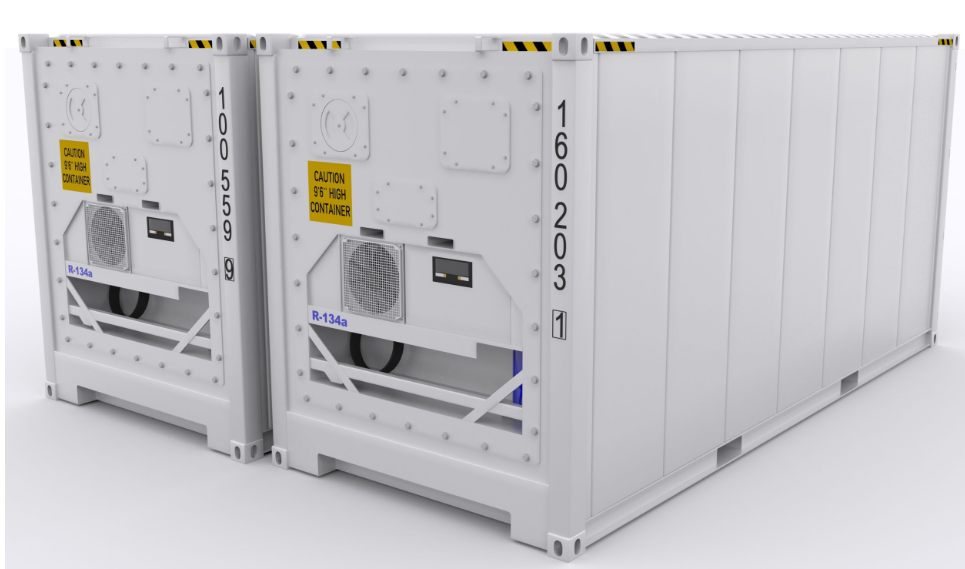When dealing with refrigerated goods in logistics, the term “Genset” comes up frequently. But what exactly is a Genset? Why is it critical in shipping, especially when handling reefer containers? In this article, we’ll break down everything you need to know about Gensets, their meaning, usage in shipping, and why they play a vital role in the safe and timely delivery of temperature-sensitive cargo.
Genset meaning: What is a Genset?
The term Genset is short for Generator Set. Essentially, a Genset is a portable generator that provides electrical power. These machines consist of a generator and an engine, housed together in one unit, hence the name “Generator Set” or Genset. Gensets are widely used across various industries for power generation, but their role in logistics is particularly crucial when it comes to refrigerated shipping containers, also known as reefers.
What is a Genset in shipping?
In shipping, a Genset serves as the primary power source for refrigerated containers during transit. Reefer containers are used to transport perishable goods such as food, pharmaceuticals, and flowers, which must be kept at controlled temperatures. To ensure that the goods remain at a consistent temperature throughout their journey, the reefer container needs a continuous power supply. This is where the Genset comes in.
A Genset attached to a reefer container powers the refrigeration unit. This makes sure that the container’s contents stay within the required temperature range during transit. Gensets are essential for ensuring that the cooling system in a reefer continues to function, maintaining the integrity of the products inside.
Types of Gensets in shipping
Choosing the right type of Genset is crucial. Gensets not only provide essential electrical power but also offer flexibility depending on the shipping method, distance, and cargo type. Gensets can be classified into two main categories, with each type serving a specific purpose and suited to different transport conditions.
Understanding the differences between these two types of Gensets is key to ensuring that perishable goods are transported efficiently and safely, without compromising on temperature control. Both types offer reliable power for reefer containers, but they differ in terms of installation, usage, and the duration of their application.
Clip-on Gensets
These are attached externally to the reefer container and are easy to install and remove. Clip-on Gensets are a flexible solution, often used for short-term requirements or when the container will be moved between different transport modes, such as from a truck to a train.
Underslung Gensets
As the name suggests, these Gensets are mounted beneath the container or the trailer. They are more permanently attached compared to clip-on Gensets and are typically used when the container is expected to remain on the same transport method for a longer period, such as an extended trucking journey.
What is a Genset container?
A Genset container refers to a shipping container that is equipped with its own Genset to provide power for refrigeration or other energy requirements. These containers are essential for transporting temperature-sensitive goods over long distances, especially in areas where external power sources are not available or during long periods in transit, such as on rail or road freight.


Why is a Genset important for reefer containers?
Reefer containers need a constant supply of electricity to maintain their internal temperatures. While a reefer container can plug into a ship’s or port’s power grid when stationary, things get trickier when the container is in transit by truck or rail. Without a Genset, there would be no way to power the refrigeration unit, causing the temperature inside the container to fluctuate, which could ruin the cargo.
The importance of a Genset becomes even more apparent when considering how vulnerable some products are. Fresh fruit, meat, seafood, pharmaceuticals, and even certain chemicals must be kept within a narrow temperature range, and any deviations could lead to spoilage or dangerous chemical reactions.
Reefer containers without a Genset: can they survive?
You might wonder if it’s possible to operate a reefer container without a Genset. The short answer is yes, but only under certain conditions. If the reefer container is stationed at a port or warehouse where it can plug into an external power supply, a Genset isn’t required. However, for transport across land or during long sea voyages without access to external power, a Genset becomes indispensable.
How does a Genset work?
A Genset operates similarly to any other engine-driven generator. It converts mechanical energy into electrical energy to provide power to the refrigerated container. Here’s a simplified overview of how it works:
- The engine in a Genset typically runs on diesel. This fuel is burned to generate mechanical energy.
- The mechanical energy produced by the engine drives the generator, which converts the mechanical energy into electrical energy.
- The electrical energy produced is used to power the refrigeration unit of the reefer container, keeping it cool during transit.
Modern Gensets are designed to be highly efficient and capable of running for extended periods without needing refuelling. Many Gensets also come with automatic controls that can adjust the power output depending on the specific needs of the reefer container.
Gensets and environmental impact
With the global push towards sustainability and reducing carbon footprints, Gensets are evolving. Traditional diesel-powered Gensets contribute to emissions, but newer models are becoming more eco-friendly, with low-emission engines and designs that improve fuel efficiency. Additionally, there are initiatives to develop electric Gensets that use battery power instead of diesel, reducing the environmental impact even further.
Benefits of using Gensets for shipping
These portable power units offer a range of benefits that help safeguard the integrity of perishable cargo. From maintaining consistent temperatures to enhancing operational flexibility, Gensets have become a critical component in the logistics chain.
Gensets also contribute to cost-efficiency, operational reliability, and the ability to meet tight delivery timelines, making them indispensable in modern shipping operations.
Temperature control: Gensets ensure a continuous power supply, keeping goods at the required temperature, which is essential for perishable cargo.
Reliability: Since Gensets can operate independently of external power sources, they provide a reliable solution for long-distance and intermodal shipping.
Flexibility: Gensets can be attached to various types of containers, making them versatile and adaptable for different shipping needs.
Cost efficiency: Gensets eliminate the need for expensive temperature control systems at each point in the logistics chain. By powering reefer containers during transit, they also reduce the risk of spoilage, saving costs associated with lost or damaged goods.
Choosing the right Genset for your shipping requirements
Selecting the appropriate Genset is a decision that impacts both the efficiency and cost of your logistics operations. With various types of cargo and different modes of transport, it’s essential to choose a Genset that aligns with your requirements.
Factors such as the duration of transit, type of goods being shipped, fuel efficiency, and environmental considerations all play a role in determining the right Genset for your reefer container.
- Duration of transit: How long will the reefer container be in transit? Longer journeys may require larger or more fuel-efficient Gensets.
- Type of cargo: Some cargo requires tighter temperature control than others. Delicate goods like pharmaceuticals might need a more sophisticated Genset to ensure consistent conditions.
- Transport method: Will the reefer container be primarily transported by road, rail, or sea? The method of transport can influence the type of Genset you need.
- Fuel efficiency: Since Gensets are typically diesel-powered, it’s important to choose a unit that is fuel-efficient to keep operational costs down.
The future of Gensets in shipping
As the logistics industry continues to advance, we can expect innovations in Genset technology to keep pace. Hybrid and electric Gensets are already being developed, promising reduced emissions and enhanced efficiency. Plus, as regulations tighten around environmental standards in shipping, Genset manufacturers are likely to prioritise designs that minimise the environmental impact while still delivering reliable performance.
Gensets play an indispensable role in the shipping and logistics industry, particularly when it comes to transporting temperature-sensitive goods in refrigerated containers. By providing a reliable, mobile power source, Gensets ensure that your cargo remains at the optimal temperature, safeguarding its quality throughout the journey. Whether you’re shipping food, pharmaceuticals, or other perishable items, choosing the right type of Genset and understanding its benefits can significantly impact the success of your operations.
Here at AGI Global Logistics, we understand the critical importance of reliable power for your refrigerated shipments. With years of experience in providing bespoke logistics and freight solutions, we can help you choose the right Genset for your unique shipping needs. Contact our team today to discuss your requirements and discover how our flexible Genset solutions can support your logistics operations, ensuring the safe and timely delivery of your temperature-sensitive cargo. And for all of the latest AGI news, don’t forget to follow us on LinkedIn and Facebook!
